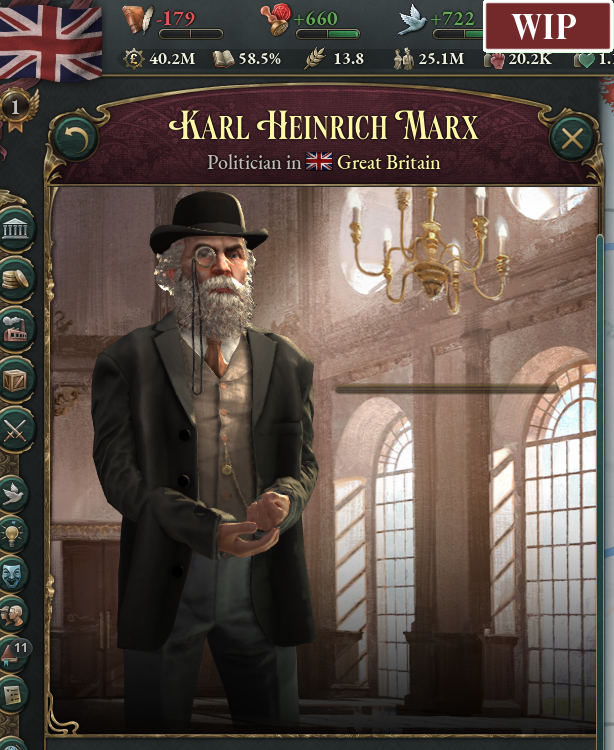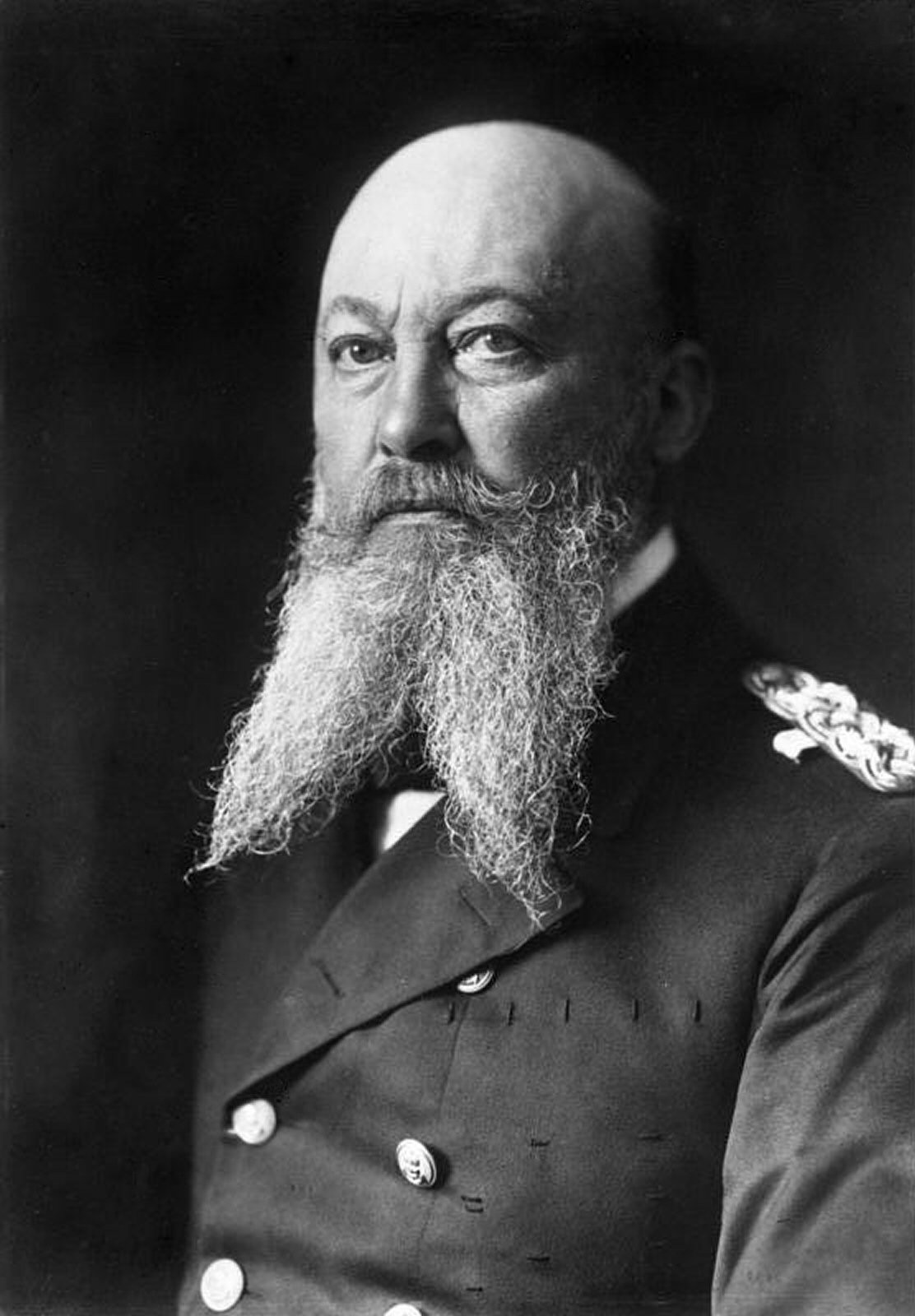.jpg)
His Imperial and Royal Apostolic Majesty, By the Grace of God Emperor of Austria, King of Hungary and Bohemia, Dalmatia, Croatia, Slavonia, Galicia, Lodomeria and Illyria; King of Jerusalem, etc.; Archduke of Austria; Grand Duke of Tuscany and Cracow; Duke of Lorraine, Salzburg, Styria, Carintia, Carniola and Bukovina; Grand Prince of Transylvania, Margrave of Moravia; Duke of Upper and Lower Silesia, of Modena, Parma, Piacenza and Guastalla, of Auschwitz and Zator, of Teschen, Friaul, Ragusa and Zara; Princely Count of Habsburg and Tyrol, of Kyburg, Gorizia and Gradisca; Prince of Trento and Brixen; Margrave of Upper and Lower Lusatia and in Istria; Count of Hohenems, Feldkirch, Bregenz, Sonnenberg etc.;
Lord of Trieste, of Cattaro and on the Windic March; Grand Voivode of the Voivodeship of Serbia etc., etc.

Interest Group Ideologies, such as Liberal for the Intelligentsia and Jingoist for the Armed Forces, are for the most part set in stone outside of some special instances. Interest Groups represent broad class interests rather than the prevailing political zeitgeist, so we’ve taken care to ensure that their Ideologies align with those interests. The Rural Folk’s Particularist Ideology, for instance, opposes Serfdom, Debt Slavery, and Peasant Levies - and it’s difficult to imagine them changing their stance on such matters.Lord of Trieste, of Cattaro and on the Windic March; Grand Voivode of the Voivodeship of Serbia etc., etc.

Market Liberals can appear after researching Stock Exchange, and may well decide that they want to shake up your tightly controlled or agrarian economy.


The Ideologies of your Interest Group Leaders, however, do represent the prevailing political zeitgeist within their own section of society. Every character comes with their own personal Ideology, determined by a wide variety of factors reflecting the material and political conditions of your nation. I’ll list a few examples of these factors:
- Fascist leaders are more likely to emerge in countries that are paying War Reparations after losing a war.
- Radical leaders are more likely to emerge in absolute monarchies with high turmoil in incorporated states.
- Communist leaders are more likely to emerge in countries with large urban centers and low living standards for the lower strata.
- Social Democrats are less likely to emerge from content Interest Groups - angry IG’s will turn towards more radical forms of socialism.
- Theocrats are more likely to emerge when your country has the State Religion law and the Devout Interest Group is powerful.
- Market Liberals are more likely to emerge in countries with large Urban Centers and less “modern” economic laws like Traditionalism and Mercantilism.
Mr Marx here is one of several historical figures who has been lovingly sculpted by our artists. He can show up in your country shortly after researching Socialism, and may become the Interest Group Leader for the Trade Unions.

Some characters have a specially defined historical appearance, such as Mr Marx here or the Kaiser above. We’ll have a limited number of these on release, but we expect to continue adding more historical DNA to both characters present in the start date and characters who can emerge later in the game. Likewise, many countries (especially those we expect to be popular among players) have an historical set of starting Interest Group Leaders and Commanders but not all. Once again we expect to flesh this out further as we deep-dive into particular regions post-release. Where historical characters haven’t been defined, the game will generate a character with an appropriate Ideology based on the factors described above.
A variety of historical figures can emerge as the game progresses beyond 1836. We can define everything you’d expect about a character like their religion, ethnicity, and traits, but there’s also a little more we can do here. Taking US President Abraham Lincoln as an example, we’ve set the earliest date that he can become an Interest Group leader to 1847 (when he first entered the House of Representatives, joining the national political stage). We can set both country-level and Interest Group-level triggers on when it’s appropriate for a character to emerge - Lincoln can emerge only in the USA, and he can join either the Intelligentsia or Rural Folk if they are not Marginalized. We can also determine the chance that a politician will emerge every time a suitable Interest Group selects a new leader.
Santa Anna’s political and military career is as long as it is fascinating. The day he was captured by the Texan army however was not one of his best days - should this happen in Victoria 3, Mexico will be forced to capitulate and recognize Texan independence.

Every character has one or more Roles that determine their impact on your nation. Characters can sometimes have multiple roles, for instance it is possible to Grant Command to your monarchs and dictators give them the ability to command your armed forces personally. Characters can have the following Roles:
- Rulers. The King, the President, the Pope, the head honcho of the nation. Who rules your country is determined by your Governance Principles law.
- Heirs. Heirs exist only in monarchies, and primarily spend their time waiting for mummy or daddy to pop off so they can have their turn on the throne.
- Politicians. These are Interest Group Leaders, whose ideologies are a huge determining factor for the laws you can pass and the Political Movements that will emerge.
- Commanders. Your Generals and Admirals, heroically (or not so heroically) leading your forces into battle.
A Charismatic Interest Group Leader can provide a very large boost to their IG’s Pop Attraction, which if you want to empower that IG can be a powerful advantage in realizing your ambitions. If the Charismatic leader is a member of an IG you are not so keen on however, they may become a painful thorn in your side.


Each character also has Character Traits. Traits have a variety of effects, and these effects can differ depending on the Character’s Role(s). Let’s take the Cruel Trait as an example. All Cruel characters take a very substantial hit to their Popularity (more on that in just a bit), but the other effects are applied depending on the character’s role. A Cruel commander will encourage his forces to cause more casualties to the enemy and more devastation in the course of the war. When an IG has a Cruel leader, they will gain more approval for being included in the government. Finally, a Cruel Ruler enjoys cheaper Decrees (Violent Suppression might be a favorite), but opposition IG’s will more readily disapprove of the government and all pops in the nation will have reduced standard of living. Other Traits include Ambitious, Pillager, Innovative, and of course Opium Addict.
A character’s virtues and vices may impact their Popularity - Mr Pretorius here has many fine qualities, but his relationship with cocaine has caused his otherwise stellar reputation to take a hit.

Popularity is a measure of a Character’s reputation among the people of the nation. It comes primarily from their Traits, but many Events will cause Characters to rise and fall in the arena of public opinion. Like Traits, the effects of a Character’s Popularity depends on their Role(s). For the Ruler, Popularity adds Legitimacy to their government. The Popularity of Interest Group Leaders affects the attractiveness of their IG to pops and is a contributing factor to Momentum in Elections. Finally, combat units will regain their morale faster (or slower!) depending on the Popularity of their Commander.
Characters play an important role in Victoria 3. They rule nations, dominate internal politics, and command armies. Through their Ideologies, new and old ideas clash in the arena of government and public opinion, while their Traits will help or hinder their goals as well as yours.
And that is all for today! Next week, Martin will unveil the revisions to the trade mechanics since we last covered them.



